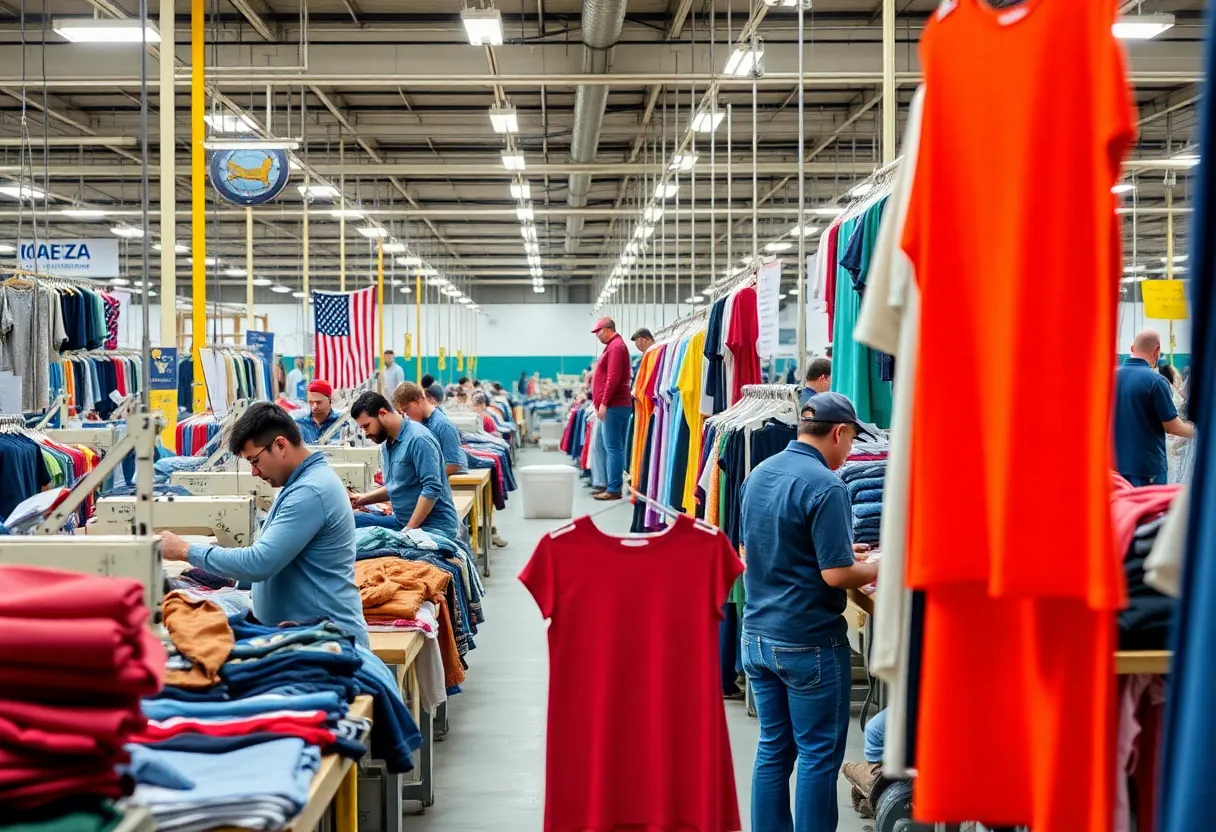News Summary
American entrepreneurs in the apparel and manufacturing sectors face challenges and successes due to recent tariff policies. Tia Robinson of Vertical Activewear and Mark Woodward of Highland Forge provide insights into adapting to these economic changes, highlighting the effects on production, sales, and labor in their businesses. Their experiences reflect the complexities of navigating a shifting economic landscape and the ongoing commitment to American-made products.
Duluth, Georgia – American entrepreneurs in the apparel and manufacturing industries are navigating the complexities introduced by recent tariff policies. Two business leaders, Tia Robinson of Vertical Activewear and Mark Woodward of Highland Forge, showcase both the challenges and successes experienced within their respective sectors due to fluctuating tariffs.
Vertical Activewear, founded by Tia Robinson, is based in Duluth, Georgia, where the company creates sustainable apparel. Robinson focuses on producing black leggings in a storefront on Buford Highway, sourcing all fabric exclusively from American mills and producing designs in local factories. At peak production, the business is capable of manufacturing up to 750 garments per week, appealing to a growing consumer base interested in American-made products.
Despite her commitment to local manufacturing, Robinson has faced challenges with uncertainty surrounding tariff policies initiated by President Donald Trump. Such policies have significantly affected her business, resulting in a dramatic increase of 145% in website traffic following the announcement of tariffs. However, while interest surged, actual sales conversions did not keep pace, as potential clients hesitated to shift suppliers amid an uncertain economic landscape.
In contrast, Mark Woodward, co-owner of Highland Forge, a custom drapery hardware manufacturer located near downtown Atlanta, reports that his business has experienced positive growth due to tariffs. The company utilizes raw or stainless steel sourced from American mills, and since the imposition of a 25% tariff on raw steel in March, sales have increased by over 40% compared to the same period last year. Highland Forge has added two new positions to cope with the elevated demand, attributing this growth to a surge in clients seeking American-made alternatives following tariff implementations.
Both Robinson and Woodward highlight the ongoing struggle to find skilled labor to sustain their growth in the face of increased demand. Robinson’s lead sewist, Veronica Chapman, who has an extensive background in sewing with reputable brands like Spanx and Nike, represents the type of skilled labor that is increasingly difficult to secure. Similarly, Woodward collaborates with local technical colleges to address his labor shortages.
Tariff Implications
Since the introduction of tariffs, Robinson’s experience illustrates a dual-edged sword. Increased traffic to her website suggests a burgeoning interest in American-made products, a sentiment bolstered by Trump’s tariff policies aimed at supporting domestic manufacturers. However, Robinson remains cautious, expressing concern over whether these new inquiries will translate into concrete sales, as many businesses are currently delaying decisions while awaiting clarity regarding long-term tariff implications. Michelle Dennard from the Federal Reserve Bank of Atlanta notes that this hesitation is common among business owners faced with evolving market conditions.
On the other hand, Woodward’s experience contrasts sharply. His company benefits from a streamlined pricing strategy that allows Highland Forge to maintain a competitive edge, even as other businesses are forced to raise prices due to tariffs. This adaptability has positioned Woodward’s company favorably, and he recognizes the tactical advantage the current market conditions present.
Both entrepreneurs exemplify the “Made in America” ethos, responding to current market dynamics and the challenges of domestic manufacturing. Robinson’s sustainable approach to activewear and Woodward’s efficient manufacturing processes illustrate the resilience and adaptability of American businesses amid tariff changes, ensuring that they remain competitive in a global economy.
As these entrepreneurs continue to navigate the shifting landscape brought on by tariffs, the importance of skilled labor and the commitment to domestic production remain at the forefront of their business strategies, suggesting that American manufacturing still holds a vital position in the economy.
Deeper Dive: News & Info About This Topic
- AJC: Meet the Georgia Manufacturers Who Stand to Benefit from Tariffs
- Wikipedia: Tariff
- Duluth News Tribune: Duluth Entrepreneur Launches Upscale Sauna Accessories Line
- Google Search: American manufacturing
- Business North: Entrepreneur Joel Labovitz Dies at 92
- Encyclopedia Britannica: Manufacturing

Author: STAFF HERE AUGUSTA WRITER
The AUGUSTA STAFF WRITER represents the experienced team at HEREAugusta.com, your go-to source for actionable local news and information in Augusta, Richmond County, and beyond. Specializing in "news you can use," we cover essential topics like product reviews for personal and business needs, local business directories, politics, real estate trends, neighborhood insights, and state news affecting the area—with deep expertise drawn from years of dedicated reporting and strong community input, including local press releases and business updates. We deliver top reporting on high-value events such as Arts in the Heart Festival, Westobou Festival, and Masters Week. Our coverage extends to key organizations like the Augusta Metro Chamber of Commerce and Greater Augusta Arts Council, plus leading businesses in manufacturing and healthcare that power the local economy such as Textron Specialized Vehicles, Cardinal Health, and Nutrien. As part of the broader HERE network, including HEREAtlanta.com and HERESavannah.com, we provide comprehensive, credible insights into Georgia's dynamic landscape.


